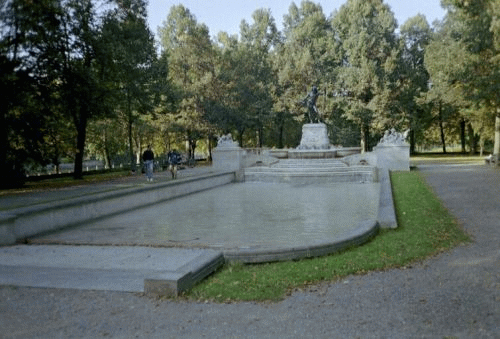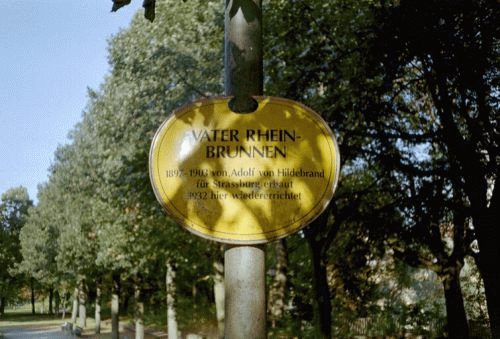Who are we? -
Contacts -
Collaboration -
Site Map
Inscriptions of Munich <
Inscriptions of Germany <
Areas of Interest <
Welcome
Whoever knows the geography of Germany will never believe that there is a monument for "father" Rhine in Munich. The place where the Rhine river is nearest to Munich is some 300 km southwest (near St. Margarethen in Switzerland). The Rhine does not cross Bavaria anywhere.
This monument, however, exists! See yourself:

This monument dedicated to "father" Rhine is located on the same island as the technical museum (Deutsches Museum), in the centre of the city of Munich. Needless to say that in summer the monument becomes a swimming pool for small and bigger children... (This is normal for a river, isnt it?)
If you want to have a closer look at the statue, see below.
|
|
|
|
The mystery is explained on a plaque near the entry of the esplanade:

All the photos of this page: Hans-Rudolf Hower, 2002
Original Text
|
Vater Rhein-Brunnen 1897-1903 von Adolf von Hildebrand |
Translation
|
Father Rhine's Fountain
erected in 1897-1903 by Adolf von Hildebrand |
Comment
According to Biller/Rasp (p. 170), this monument ordered by the Strasbourg lawyer Sigismund Reinhard and built right in front of the Strasbourg municipal theater was initially named "Reinhardbrunnen" (in German because at the moment Strasbourg was a German city). When the fountain was demolished in 1919, just the bronze statue could be saved for the city of Munich, where the whole installation was rebuilt, somewhat smaller and somewhat modified. This fountain is considered as an excellent example of classicist sculpture of the end of the 19th century.
During the interwar, Bavaria had many political problems with its possessions located on the western side of the Rhine river, i.e. the Palatinate (loss of the Saar, secessionist mouvements, conflicts with France). All this explains why the Bavarians were likely to think of the Rhine river with a certain emotion. And perhaps it also explains why the monument was re-erected far off the Rhine...
Historical epilogue:
Since 1945, the Palatinate has been part of the state of Rhineland-Palatinate and the Rhine is no more a Bavarian river...
Bibliography
|
Author / title |
Notes |
Info / purchase |
|
Detailed and well-structured guide that may also be used as a reference book. |
- amazon.de/at: allemand. |
Arrival by Public Transport
The nearest S-Bahn stations are Isartor and Rosenheimer Platz. You can walk for the rest: out of town from Isartor or into town from Rosenheimer Platz. But there is also a direct tramway line from both stations as well as from Karlsplatz (Stachus), Sendlinger Tor, and Max-Weber-Platz underground stations (exit at Deutsches Museum). The fontain is in the little park of the island, downstream.
Indications concerning the arrival correspond to our personal knowledge or even experience, but we cannot assume any responsibility for their rightness. When you are reading this page, things may have changed in reality.
Hans-Rudolf Hower, 2002
Frequently-asked questions - Webmaster
Last updated: April 4, 2016